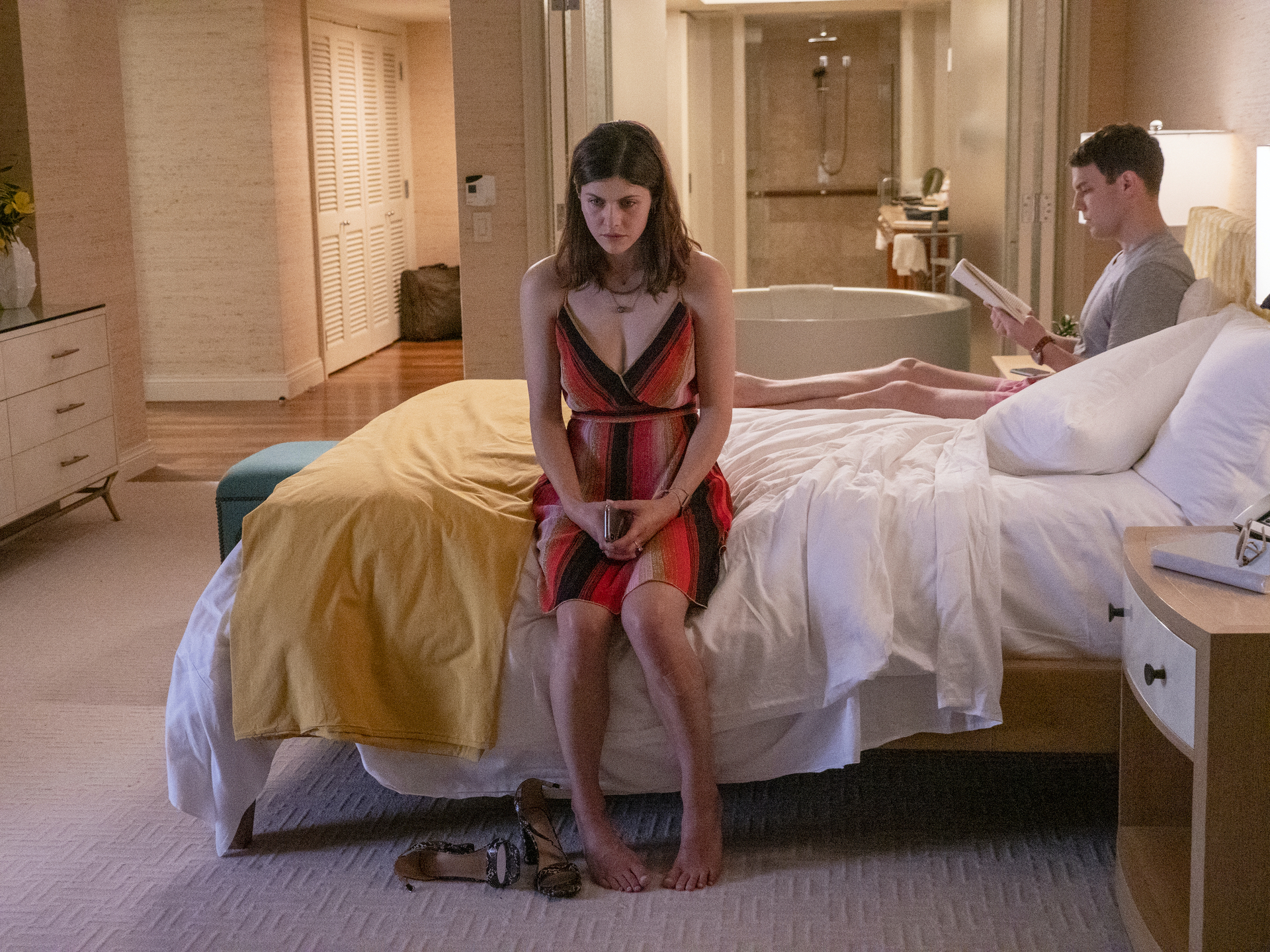
Of all the wealthy clientele checking into The White Lotus, the Hawaiian resort at the dark heart of the eponymous HBO series, one person is very obviously out of their comfort zone: Rachel, the wide-eyed 30-something honeymooner, brilliantly underplayed by Alexandra Daddario.
“I’m a journalist,” Rachel says by way of introduction. “Mostly profiles.” She’s freelance, writing “all over the place,” and constantly worrying about money. It’s her new husband, Shane, and his family wealth, then, that are bankrolling their reservation in the Pineapple Suite, Rachel’s price-upon-request Goyard tote, and her impending nervous breakdown. The vibes, to say the least, are very bad.
At first, Rachel attempts to fit in among the 1 percent and their Nietzsche-reading kids. But the newlywed glow fades fast under the tiki torches. While The White Lotus is a smart send-up of the unreality of wealth, Rachel ends up becoming one of the most devastatingly accurate on-screen portrayals of digital media workers to date.
For one, Rachel isn’t writing a “Bradley Cooper Is Not Really Into This Profile” anytime soon, though she’d love for you to think otherwise. Mostly, she aggregates her pieces — or, as Shane scoffs, she writes “clickbait gussied up as some, like, high-minded trendy woke bullshit.” That’s fairly standard in her line of work, of course. But the mundane reality is revealed with devastating economy when Rachel tells search engine SheEO and fellow vacationer Nicole Mossbacher (Connie Britton) about the time she “profiled” her — in a Business World piece, “10 power women in the tech world.”
With those buzzwords, the tone shifts. “You’re kidding,” Nicole says, careful to maintain her placid expression in public. “That was a fucked-up piece.” Rachel tries to push back, explaining her journalistic duty to mention the #MeToo lawsuits. But neither woman comes off well: Nicole, it’s clear, is something of the “Machiavellian Gorgon” she’s afraid to resemble. Rachel’s only defense is that Nicole shouldn’t be mad, because it was a “puff piece” and Rachel was “basically just repurposing the profile of you from the Post.”
“Well,” Nicole retorts, “that’s just bad journalism.”
And then there’s the pay. In the same episode, Rachel tells Shane she’s considering taking on an assignment: “Oh, it’s, um, about a YouTube influencer who sponsored a Get Out The Vote campaign. And then he took the five winners to Burning Man in an electric RV that can actually hover above the ground.” She’s convinced herself the piece matters (“He got 80,000 teenagers to register to vote!”), but more than anything, she’s worried if she says no, her editors will stop coming to her with assignments. Shane tells her not to do it and, in the face of her resistance, offers to pay her double the “few hundred dollars” she’s being offered. “You can get paid to have fun on your honeymoon with me!”
In just a few scenes, Rachel encapsulates the frustrating reality of working in news media today: It’s passé to point out that most of us are poorly paid, but few will admit publicly that they don’t even get to do the work they want to do in exchange. And it is “rude,” as Shane points out, to consider an assignment on your honeymoon. But every freelancer knows, you have to consider every opportunity carefully.
Recently, there’s an indication that prestige TV is interested in holding up a mirror to this side of the media industry. Perhaps The White Lotus’s only peer is the Vaulter bloodbath in Succession, when Kendall Roy (Jeremy Strong) closes a publication and fires a roomful of journalists without batting an eye. Both shows understand the unglamorous reality of the industry and the gnawing feeling in many of its participants’ stomachs. With people like Gawker alum Cord Jefferson luring journalists from the trenches of news-making to the glitz and glam of screenwriting, we may be seeing a lot more of ourselves.
It’s a necessary departure. Typically, journalists are depicted either as heroic investigators (the teams in All The President’s Men and Spotlight) or flailing floozies (Camille and the detective in Sharp Objects, Rory and the Wookiee in Gilmore Girls: A Year in the Life, Zoe and then-Congressman Frank Underwood in House of Cards. Rachel feels more familiar: She has a stronger sense of ethics than these aforementioned women, but the quiet fatalism of someone who knows there’s essentially zero chance of her ever joining the ranks of a well-funded investigative unit — if that’s what she ever wanted.
The most uncomfortable parallel of all may be that Rachel married up. In journalism schools, industry veterans (older white men) make old-school jokes like, the only way to make it as a (female) journalist is to marry rich. It’s gross, but many graduates discover it’s true: Plenty of beloved writers, especially those who freelance, have partners with more “stable” careers. Some of those j-school students will find, with time, that they have become the punchline.
Or, more specifically, I have become the punchline. I’m a white female millennial freelance journalist who just this summer got married to a man who makes a lot more money than me. (Fortunately, he respects me and I do not hate him.) I’m writing this piece for $300 and I’m very excited about it. If I was on my honeymoon and couldn’t take the assignment, I’d feel a little pang of longing. Fortunately, we haven’t decided where to go for our honeymoon yet. People keep suggesting Hawaii.
Eleanor Cummins is a freelance journalist and adjunct professor in New York University’s Science, Health, and Environmental Reporting Program. Her work has appeared in Vox, The New Republic, The Atlantic, National Geographic, and more.